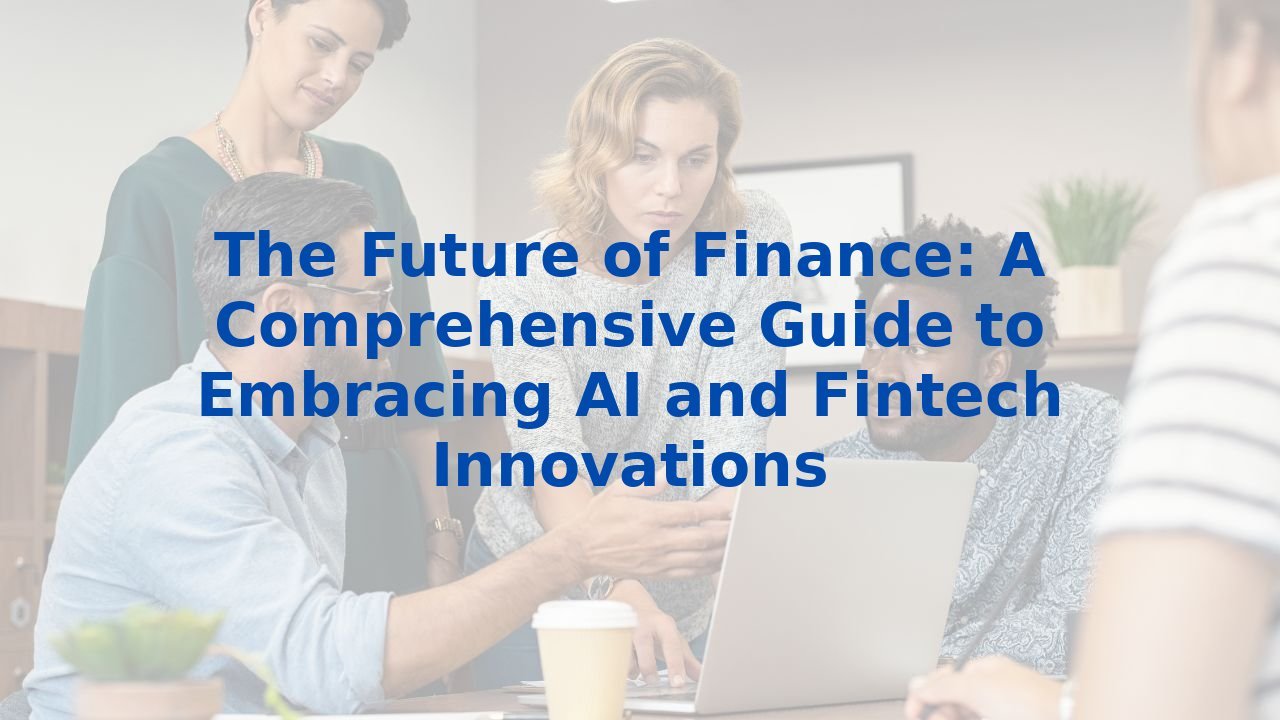The Future of Finance: A Comprehensive Guide to Embracing AI and Fintech Innovations
The Future of Finance: A Comprehensive Guide to Embracing AI and Fintech Innovations
The finance landscape is evolving at an unprecedented pace, reshaped by cutting-edge technologies that redefine our relationship with money. At the center of this shift is artificial intelligence (AI), a game-changing force that streamlines financial processes and unlocks new dimensions of operational efficiency. In this guide, we will explore how businesses can harness the power of AI, the transformative impact it has on essential financial processes, and the paramount importance of equipping employees for this new era.
The Evolution of Finance
As we peer into the future, several key trends emerge that signal the growing integration of AI in finance. These trends include the surge of contactless payments, the rise of AI-driven investment platforms, enhanced data security through biometrics, and the democratization of finance through peer-to-peer lending and online banks. Each of these trends showcases the unique ways technology is making financial transactions faster, safer, and more inclusive.
How AI is Transforming Financial Processes
AI isn't just a buzzword; it’s a transformative tool that enhances various financial processes in profound ways. Here are some key areas where AI's impact is most evident:
Improving Risk Management
One of the most critical challenges in finance is managing risk effectively. AI algorithms have the unparalleled ability to analyze vast datasets to identify potential risks and anomalies. For example, by predicting loan defaults and detecting fraudulent activities in real-time, AI enables financial institutions to make more comprehensive risk assessments and protect themselves from significant losses.
Automation of Routine Tasks
AI takes the manual workload off human shoulders by automating repetitive tasks. This means quicker data processing and a dramatic improvement in accuracy. Financial institutions can focus their resources on high-value activities, ensuring that employees are engaged in strategic planning and decision-making, rather than drowning in paperwork.
Personalized Financial Services
In an era where consumers expect tailored experiences, AI makes personalization a feasible reality. Using machine learning, robo-advisors analyze customer profiles to provide customized financial advice. This personalization addresses individual financial goals and risk tolerances, creating a more satisfying banking experience for clients.
Fraud Detection
With the growing sophistication of financial crimes, the need for robust fraud detection has never been greater. AI excels in this arena by scanning transaction data and flagging suspicious activities almost instantaneously. The capacity to recognize unusual patterns helps organizations preempt identity theft and cyberattacks before they escalate.
Predictive Analytics for Anticipating Market Trends
Predictive analytics leverages historical and real-time data to forecast trends, making it invaluable for financial decision-making. Whether anticipating customer behaviors or projecting market shifts, AI gives organizations the insight they need to adapt their strategies proactively.
The Benefits of AI for Financial Organizations
Embracing AI isn't merely a technological upgrade; it’s a strategic choice that comes with myriad benefits for financial institutions:
- Enhanced Decision-Making: AI provides data-driven insights that unlock patterns and trends often missed by human analysts, leading to more informed decision-making.
- Improved Customer Experience: The customization afforded by AI ensures interactions are tailored and relevant, fostering deeper customer loyalty and satisfaction.
- Cost Savings: Automating tasks translates to decreased operational costs, allowing financial organizations to allocate resources more effectively.
The Importance of Employee Training in AI
While technology reshapes finance, the human element remains critical. The success of AI integration hinges on adequately training employees to work alongside these advanced systems. Here’s why this is essential:
- Understanding AI Systems: Employees must grasp how AI functions and its applications within existing processes to optimize its benefits.
- Data Interpretation: Workers skilled in data analysis can extract actionable insights from the data generated by AI systems, amplifying its effectiveness.
- Adaptability: In a rapidly shifting landscape, upskilling ensures that employees remain adaptable, helping organizations harness the latest tech advances.
- Ethical Considerations: Training in ethical AI practices fosters responsible use, addressing concerns related to bias and data privacy.
Conclusion
As we advance into a future profoundly shaped by AI, financial institutions must recognize the immense potential of this technology. By streamlining processes—from risk management to personalized customer service—AI stands as a pillar of efficiency and innovation. However, its success relies on the investment in employee training to build a workforce capable of navigating this new paradigm. Embracing AI isn't just about adopting new tools; it’s about fostering a culture of continuous learning and adaptation that will ultimately shape the future of finance.
The journey toward AI integration in finance will carve new pathways for growth and operational excellence. As we embrace this evolution, we open doors to a smarter, more efficient financial ecosystem.



